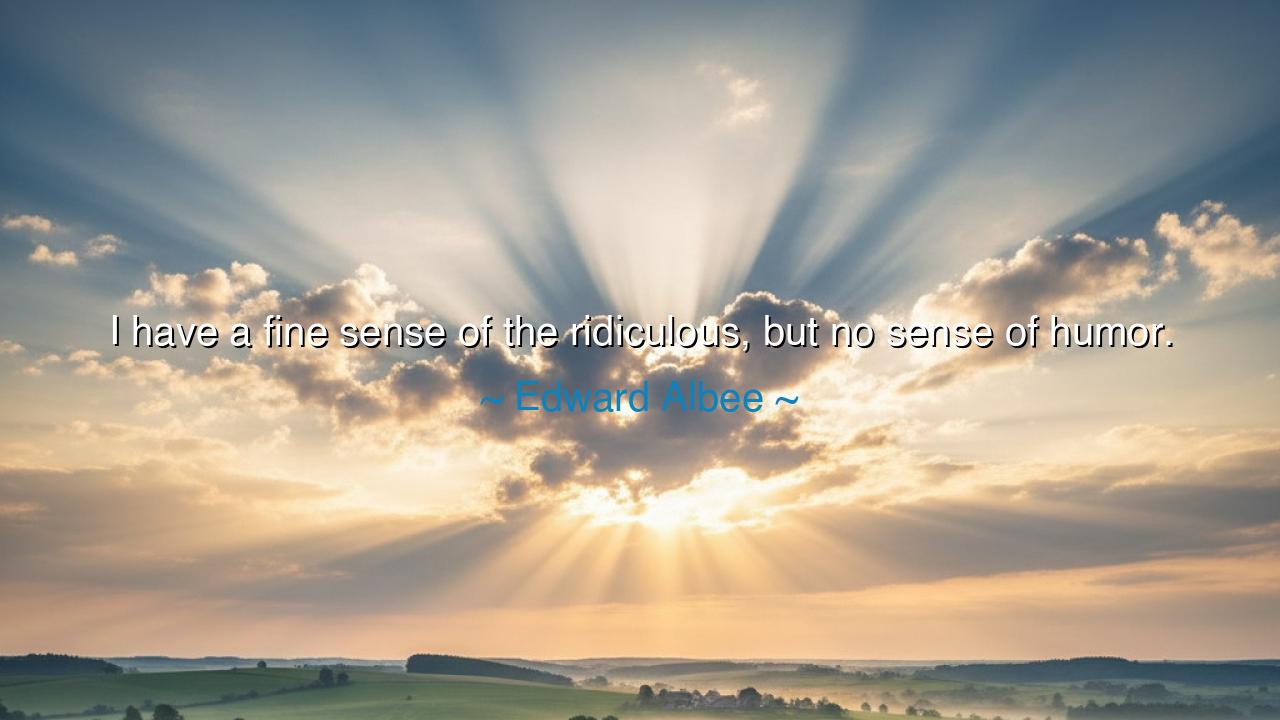
I have a fine sense of the ridiculous, but no sense of humor.






When Edward Albee said, “I have a fine sense of the ridiculous, but no sense of humor,” he revealed a subtle yet piercing insight into the human condition. To perceive the absurdity in life — the contradictions, the pretensions, the ironies — is to possess a sense of the ridiculous. Yet to laugh, to soften that perception with joy or amusement, requires a sense of humor that is separate, rare, and delicate. Albee’s confession suggests a mind capable of acute observation and critique, but one that does not always find relief or release in laughter. The ridiculous may be recognized; the playful transformation of it into humor may not follow naturally.
The ancients understood this distinction well. Aristotle wrote of comedy and tragedy as separate modes of catharsis. Comedy could elevate through laughter, softening the harshness of reality, while tragedy could illuminate through suffering and reflection. Albee’s remark echoes this ancient wisdom: to see absurdity is not synonymous with joy. Insight and amusement, though often linked, are not inseparable. To have a sharp perception of life’s folly is one talent; to transform that perception into lighthearted laughter is another, requiring temperance, empathy, and emotional agility.
Albee’s own life and work illustrate this tension. In plays such as Who's Afraid of Virginia Woolf?, he exposes the grotesque pretensions and petty cruelties of his characters with surgical precision. The situations he constructs are absurd, tragic, and at times almost comically exaggerated — yet they are seldom sources of light amusement. The audience recognizes the ridiculousness, but the emotional weight remains, provoking reflection rather than laughter. Albee’s art exemplifies the difference between seeing the absurd and possessing humor that transforms it into delight.
A historical parallel can be found in Jonathan Swift, whose satires like A Modest Proposal reveal the grotesque absurdities of society. Swift’s sense of the ridiculous is piercing, exposing human folly and institutional corruption with cold precision. Yet while the text is darkly ironic, the humor is not comforting; it shocks, provokes, and unsettles. Like Albee, Swift demonstrates that recognition of absurdity can exist independently of joyful or lighthearted humor — the awareness itself carries weight, warning, and sometimes discomfort.
Albee’s distinction also carries a philosophical dimension. To perceive the ridiculous is an intellectual exercise; to laugh requires emotional generosity. The mind may detect contradictions, hypocrisies, and absurdities with clarity, yet the heart may withhold amusement, recognizing the suffering, consequence, or cruelty entwined within those absurdities. The ancients often noted this: wisdom and discernment can coexist with sobriety, reflection, and even sorrow. To sense the ridiculous is to be awake to truth; humor is a separate grace that allows levity in the face of it.
Yet there is power in possessing a fine sense of the ridiculous, even without humor. It sharpens judgment, heightens awareness, and cultivates discernment. One sees folly and pretension where others are blind, and in this lies the seed of understanding, critique, and creativity. Albee’s keen vision allowed him to hold up a mirror to society, exposing its absurdities without softening the truth with laughter. Sometimes, to endure the world, it is enough to perceive, to recognize, and to reflect, even without the release of amusement.
The lesson, then, is profound: cultivate discernment and perception, but recognize that humor is an additional skill, one that requires generosity, empathy, and perspective. Seeing the ridiculous sharpens the mind; finding humor in it eases the spirit. Albee reminds us that insight alone does not guarantee joy — the transformation from observation to laughter is a conscious act, one that must be nurtured.
In practical terms, this means observing life attentively, noting absurdities, contradictions, and ironies, while also practicing emotional elasticity to allow humor to emerge. Share your laughter generously, but do not force it where truth demands solemnity. As Edward Albee teaches, to perceive the ridiculous is a gift, but to cultivate humor is a discipline; both enrich the human experience, each in its own essential and enduring way.






AAdministratorAdministrator
Welcome, honored guests. Please leave a comment, we will respond soon